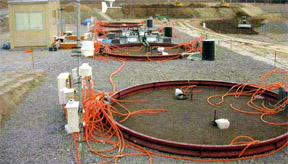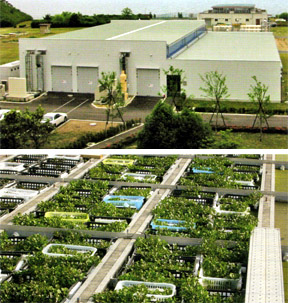
When waste is buried for landfill, substances contained in waste and their decomposition products are released into the environment as
leachates and gases. Stabilization is a process in which gas generation is subdued and leachate quality improves. It involves complex
mechanisms, because factors significantly affecting stabilization are not only chemical but also biological and physical. Since waste is
coarse in size and diverse in kind, it is necessary to conduct a demonstration experiment with a pilot plant in parallel with laboratory experiments
to understand stabilization mechanisms and test new technologies. For this reason, we have established four demonstration experiment
pits measuring 5 m in diameter and 7 m deep in a final disposal site actually in operation and are promoting research to develop new final
disposal technologies ensuring the safety and security of final disposal sites.
![[Other] Bio- Eco Engineering research laboratory](../../img/eng/cen_img28.gif)

This research laboratory is developed to provide a base for international research activities to solve environmental issues pertaining to both
Japan and overseas countries. Introducing household liquid waste from an actual treatment plant through a vacuum sewer system, we are conducting research on the
development, analysis and evaluation of recycling-type advanced-treatment Johkasou for liquid, organic waste including raw sewage and household liquid waste; energy
recovery technology from biomass such as raw garbage; eco engineering using planting and soil purification technology; and so on. While
various research programs are undertaken jointly with publicly run local environmental research institutes, universities, private
businesses, and overseas research organs, international joint research projects are also being promoted with these research facilities
utilized as the nucleus based on the Environment Ministers Meeting among Japan, China and Korea (TEMM), a Japan-China Environment Protection Agreement project, etc. Thus, this
laboratory constitutes an important base for an international environmental research network including technical training and field training
organized under JICA-KOICA joint training programs for trainees from Asian countries.
 Biotic eco-engineering research facility
Biotic eco-engineering research facility



 When waste is buried for landfill, substances contained in waste and their decomposition products are released into the environment as
leachates and gases. Stabilization is a process in which gas generation is subdued and leachate quality improves. It involves complex
mechanisms, because factors significantly affecting stabilization are not only chemical but also biological and physical. Since waste is
coarse in size and diverse in kind, it is necessary to conduct a demonstration experiment with a pilot plant in parallel with laboratory experiments
to understand stabilization mechanisms and test new technologies. For this reason, we have established four demonstration experiment
pits measuring 5 m in diameter and 7 m deep in a final disposal site actually in operation and are promoting research to develop new final
disposal technologies ensuring the safety and security of final disposal sites.
When waste is buried for landfill, substances contained in waste and their decomposition products are released into the environment as
leachates and gases. Stabilization is a process in which gas generation is subdued and leachate quality improves. It involves complex
mechanisms, because factors significantly affecting stabilization are not only chemical but also biological and physical. Since waste is
coarse in size and diverse in kind, it is necessary to conduct a demonstration experiment with a pilot plant in parallel with laboratory experiments
to understand stabilization mechanisms and test new technologies. For this reason, we have established four demonstration experiment
pits measuring 5 m in diameter and 7 m deep in a final disposal site actually in operation and are promoting research to develop new final
disposal technologies ensuring the safety and security of final disposal sites.
 This research laboratory is developed to provide a base for international research activities to solve environmental issues pertaining to both
Japan and overseas countries. Introducing household liquid waste from an actual treatment plant through a vacuum sewer system, we are conducting research on the
development, analysis and evaluation of recycling-type advanced-treatment Johkasou for liquid, organic waste including raw sewage and household liquid waste; energy
recovery technology from biomass such as raw garbage; eco engineering using planting and soil purification technology; and so on. While
various research programs are undertaken jointly with publicly run local environmental research institutes, universities, private
businesses, and overseas research organs, international joint research projects are also being promoted with these research facilities
utilized as the nucleus based on the Environment Ministers Meeting among Japan, China and Korea (TEMM), a Japan-China Environment Protection Agreement project, etc. Thus, this
laboratory constitutes an important base for an international environmental research network including technical training and field training
organized under JICA-KOICA joint training programs for trainees from Asian countries.
This research laboratory is developed to provide a base for international research activities to solve environmental issues pertaining to both
Japan and overseas countries. Introducing household liquid waste from an actual treatment plant through a vacuum sewer system, we are conducting research on the
development, analysis and evaluation of recycling-type advanced-treatment Johkasou for liquid, organic waste including raw sewage and household liquid waste; energy
recovery technology from biomass such as raw garbage; eco engineering using planting and soil purification technology; and so on. While
various research programs are undertaken jointly with publicly run local environmental research institutes, universities, private
businesses, and overseas research organs, international joint research projects are also being promoted with these research facilities
utilized as the nucleus based on the Environment Ministers Meeting among Japan, China and Korea (TEMM), a Japan-China Environment Protection Agreement project, etc. Thus, this
laboratory constitutes an important base for an international environmental research network including technical training and field training
organized under JICA-KOICA joint training programs for trainees from Asian countries.